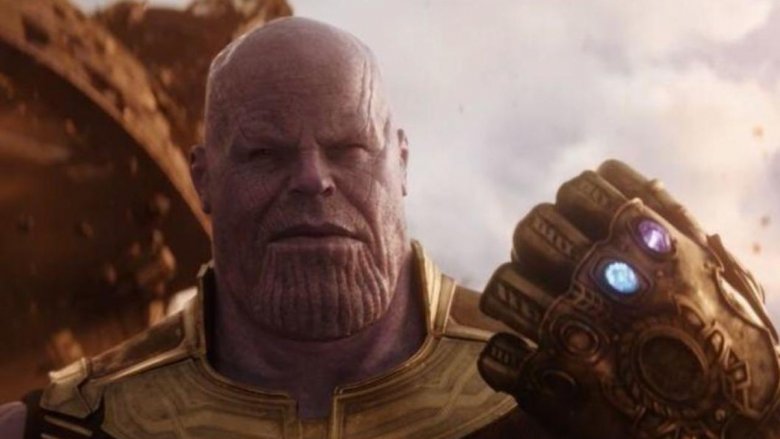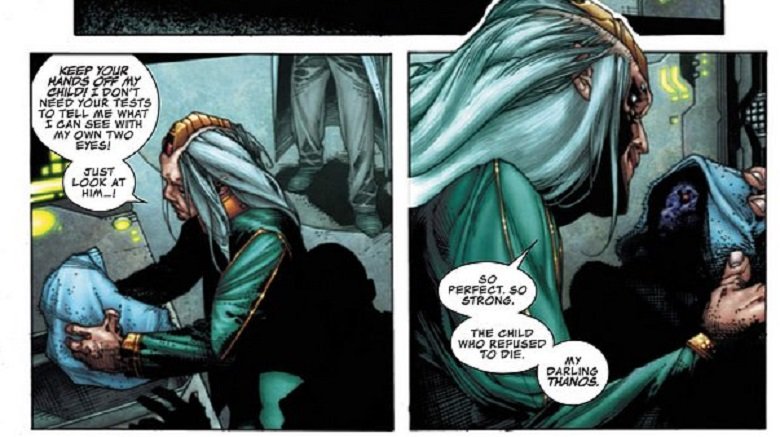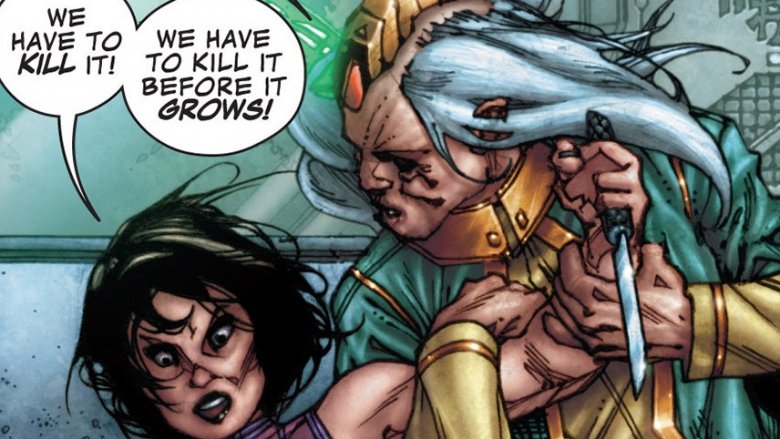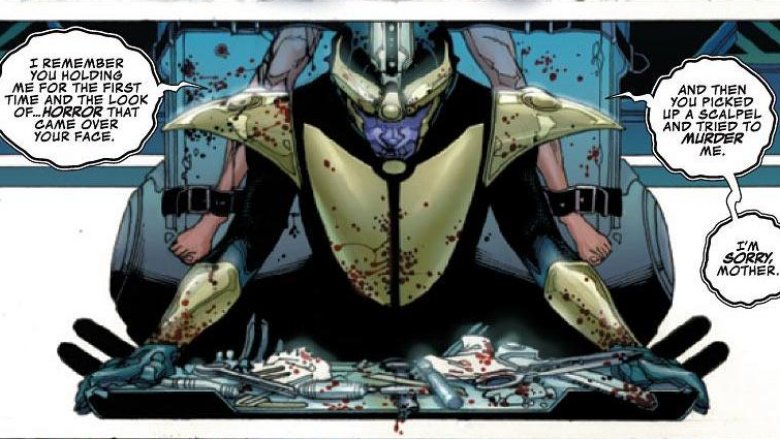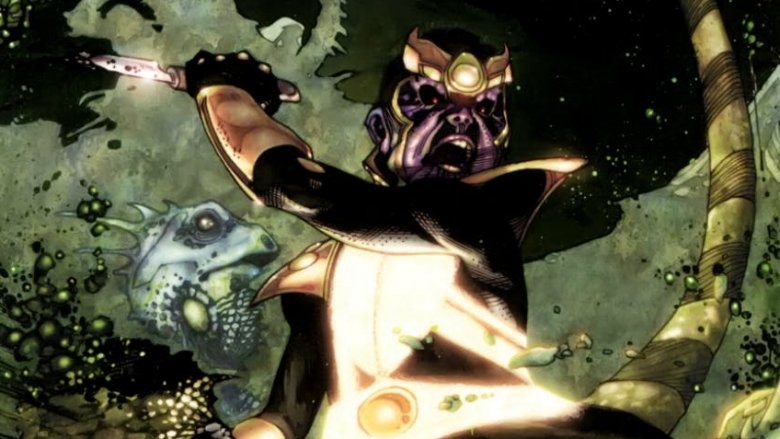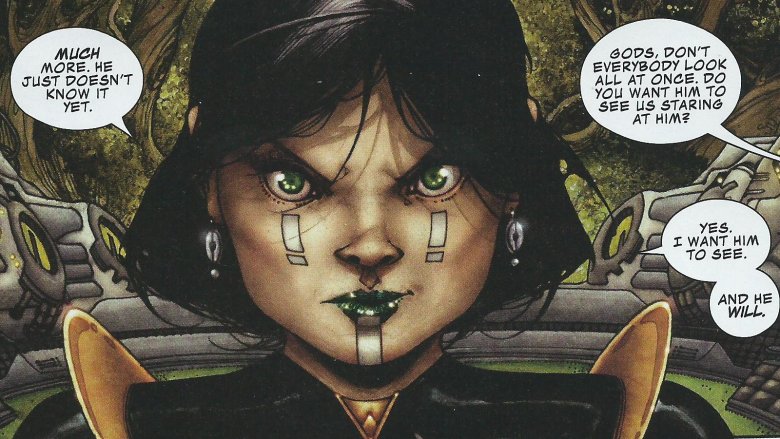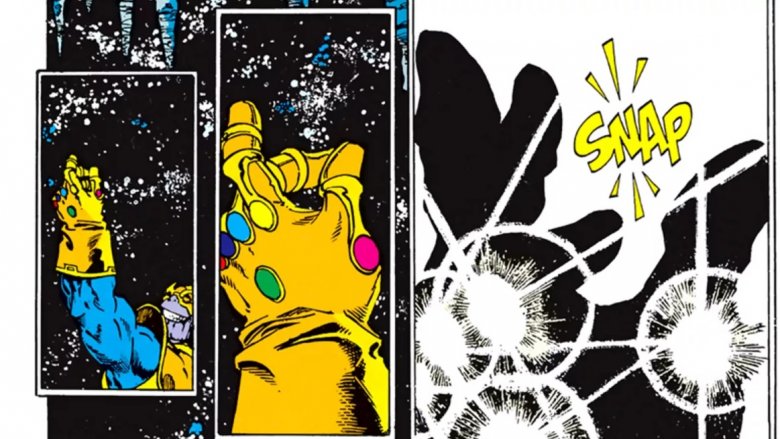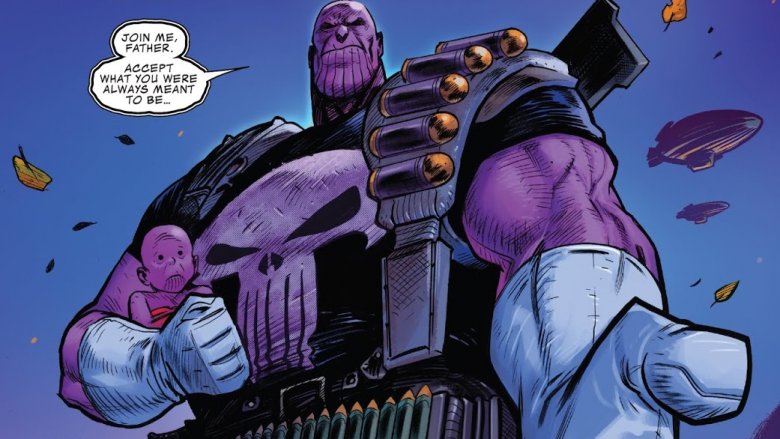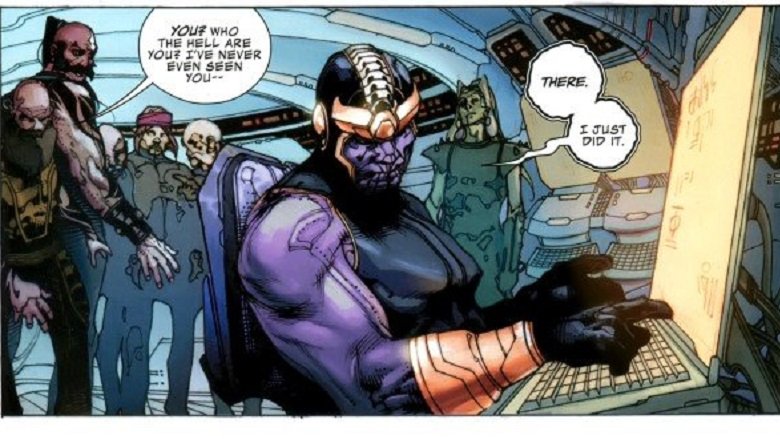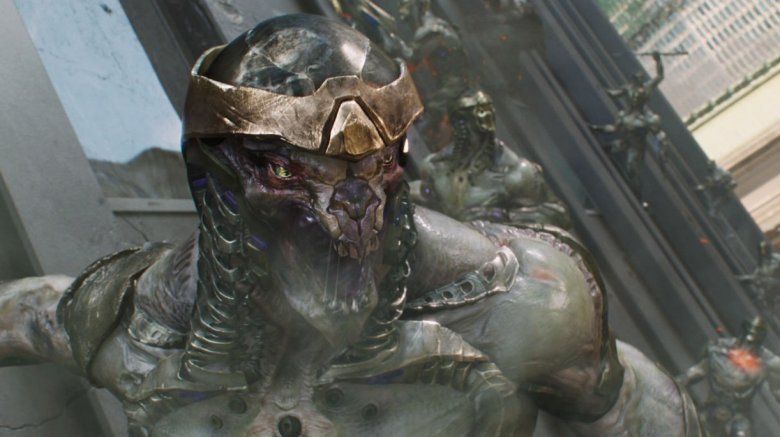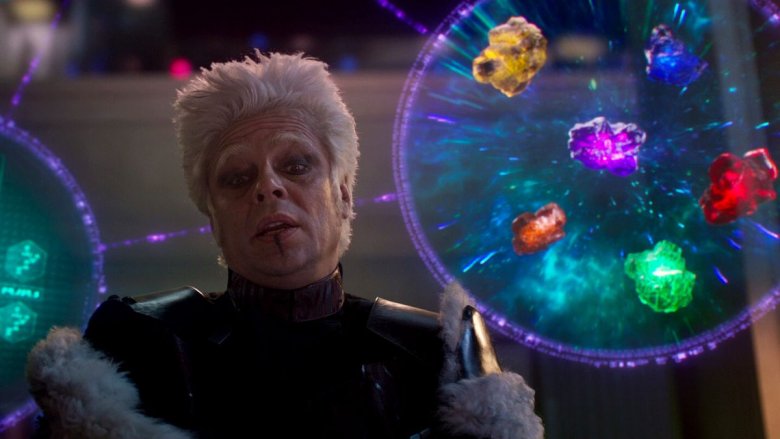Why Thanos Was Forced To Be A Villain
When confronted with a character willing to wipe out half the universe, you have to wonder exactly what ingredients make up his particular brand of crazy. Thanos is a brutal but surprisingly sympathetic villain in Avengers: Infinity War, willing to sacrifice anything to bring about what he believes will be a universal utopia.
The question of what exactly happened to forge the unyielding will of Thanos has captured the attentions of many writers, most recently Barry Lyga, who wrote the prose novel Thanos: The Titan Consumed. Based in the MCU timeline, Titan Consumed guides us from the Mad Titan's childhood, through his exile from Titan for his genocidal proposals, through his ascension to the role of intergalactic warlord.
In the universe of Marvel Comics, Donny Cates and Dylan Burnett brought us the miniseries Cosmic Ghost Rider, in which Thanos' former servant travels through time and kidnaps baby Thanos in order to raise a kinder, gentler version. In 2013, Jason Aaron and Simone Bianchi crafted Thanos Rising for Marvel. Like Titan Consumed, this presented a version of Thanos' childhood and its own explanation for the Titan's evil.
You can never expect one take to tell the whole story, especially in comics. Thanos' various origin stories, however, do have quite a bit in common. They drift from each other in certain aspects, but the basics remain the same. And all of them seem to agree that whether it was fate, neglect, or the conspiracy of powers beyond our understanding, Thanos was destined to become a villain.
An absent father
Depictions of Thanos' father, A'Lars (a.k.a. Mentor), vary across the tellings of this origin story. The A'Lars of Thanos Rising is distant, but he loves his son deeply. Shortly after Thanos' birth in Thanos Rising #1, we see A'Lars cradling the child and speaking of him with joy and pride. Later, when Thanos' crimes become common knowledge, A'Lars refuses to believe any of it. Right up to the moment that Thanos arrives to exterminate the people of Titan in the book's fifth issue, A'Lars is in denial about his offspring's evil.
Meanwhile, you would not imagine the A'Lars of the Titan Consumed novel ever referring to his son as his "darling Thanos." From childhood to his exile from Titan, Thanos hardly ever sees his father. When A'Lars does appear, his reactions to Thanos range from cold indifference to utter disdain and disappointment.
Both versions of A'Lars portray him as an absent father. The A'Lars of Thanos Rising is completely ignorant of his son's sick scientific experiments because he never bothers to spend time with him. A'Lars is absent because he's busy with his own endless research, while his counterpart in The Titan Consumed purposely steers clear of his son because he can't stand him. Regardless, the result is the same: a boy with incredible intelligence and power but no guiding hand to teach him that becoming a genocidal maniac is, you know... bad.
A hateful mother
In Thanos Rising #1, while A'Lars sees nothing but strength and potential in his son, his mother has a different reaction. Upon seeing Thanos for the first time, the tragic Sui-San grabs a nearby scalpel and tries to kill her baby. A'Lars subdues her while she rants madly. While Thanos grows from babe to pre-adolescence, Sui-San still appears to fear her son. Most of the time, she is kept restrained in a padded room. Thanos visits her and, it seems, teases her with her helplessness against him. Once, for example, he describes the moment she tried to kill him after his birth, saying he knows he must have imagined it. Eventually, Thanos murders Sui-San in Thanos Rising #2 when he decides cutting her open and exploring her insides is the key to his own self-discovery.
The Sui-San of The Titan Consumed feels similarly towards her son, though her situation differs. In the novel, Thanos never meets his mother until late in his adolescence. He discovers his father is keeping her in a "Psychosylum," a facility designed to house only Sui-San and run by artificial synthetic humanoids. Thanos expects a tearful reunion when he discovers her, and instead finds the same madness and fear as the Sui-San of Thanos Rising.
It's become cliche to blame your mom for your problems. But when your mom tries to kill you before she's even fed you for the first time and you subsequently become a mass murderer, maybe it's not a stretch to say there's a connection?
The Color Purple
The novel Thanos: The Titan Consumed is the only story of Thanos' origin in which the young villain's skin color plays an important role. In the Thanos Rising comic, it's made clear that other people notice his purple skin, but it doesn't seem to be a big issue. A group of children approach Thanos, mention his different skin color, and then immediately ask him to come play with them.
In The Titan Consumed, we find out Thanos is the only living being on Titan known with his skin color. We also learn that on Titan, the color purple is intimately associated with death. Even those who never see or meet Thanos have heard of him and see him as something of a boogieman. As such, only the most open-minded of Titan's people are willing to give Thanos the benefit of the doubt. In an early scene when Thanos tries to help a man who has fallen down, the man sees Thanos' purple hue and believes he's attacking him. Thanos does his best to calm the man and help him, but noticing the gathering crowd who don't seem eager to trust this purple-skinned young man, Thanos' only friend, Sintaa, convinces Thanos they should leave before things get ugly.
Unfortunately, the idea of someone being treated like a villain for the color of their skin isn't an unfamiliar idea, and in Thanos' case, it helps to turn an isolated young man into a cold-hearted murderer.
The lizards of Titan
In Thanos Rising #1, the young titan is not the conquering monster we might expect. He is intelligent, quiet, and gentle. He is excited the first time a group of children invite him to play with them. When a teacher instructs him to dissect a lizard in class, the boy is disgusted at the thought and runs from the room. By the end of the comic, though, we get our first glimpse at at a much different Thanos.
In the second half of the issue, Thanos invites some of his new friends to explore a cave with him. There's a cave-in and Thanos is separated from the other children. It takes days, but he eventually digs his way to freedom. He has a surprise guest during his slow escape: a lizard, whom he jokingly he assures he has no interest in eating. Unfortunately, the lizards don't feel the same, and when Thanos digs himself out, the first things he sees are the half-eaten corpses of his young friends as they're being devoured by cave lizards.
Thanos spends some long days brooding before issue one ends with the boy returning to the cave where his friends died and viciously slaughtering the lizards who ate them. It's after this that we learn the boy who once got sick at the thought of dissecting a tiny lizard is now regularly cutting open and experimenting upon the local animals, and eventually some of the local people.
Courting Death
When Thanos pleaded with Mistress Death for affection in early '90s series like Thanos Quest and Infinity Gauntlet, the object of his desire was always skull-faced and silent. You never knew if she actually wanted the Mad Titan's attentions, if she was manipulating him, or if she wished he would just go away so she could get back to watching Roseanne. In Thanos Rising, Mistress Death has a much more active role in the making of Thanos. In fact, it's a young Mistress Death who steers Thanos toward the villain we all know.
Death first appears to Thanos as a young girl, but he doesn't know her name and never sees her in class. It's this young nameless girl who convinces him to do things that awaken his darker yearnings. She's the one who suggests Thanos go to the cave that leads to his friends' deaths. She is there as he cuts open animals, other children, and eventually his own mother. Eventually, late in his adulthood, she reveals herself to him but refuses his advances. At that point, Thanos has already mated with dozens of women on different worlds. Because Mistress Death demands it, Thanos returns to each woman to brutally murder them and all of his alien children. Still rebuffing his advances, Death tells Thanos he must return to his homeworld of Titan and decimate the population before he can win her over. Thanos accepts the price and aims his armada at Titan.
Ignoring the messenger
When Thanos arrives on Titan in Avengers: Infinity War, he tells Doctor Strange his homeworld is a ruin because no one heeded his warnings. In Thanos: The Titan Consumed, we see exactly how this unfolded. Once he discovered Titan was in trouble, Thanos brought the data and his murderous solution to his father. A'Lars reacted by calling Thanos mad. He disregarded Thanos' genocidal proposal and ignored the notion that Titan was overpopulated. Not willing to accept failure, Thanos projected a gigantic holographic image of himself in Titan's largest city and told the world his proposal.
The price for Thanos' broadcast was swift and steep. His only friends cut off contact. As Titan no longer experienced crime, there were no prisons in which to keep Thanos, so he was exiled from the planet. Thanos swore he would return to Titan to save it, but eventually he learned the apocalyptic end he predicted came to pass while he was off-world.
One might argue that the people of Titan did nothing wrong. After all, he was declaring an intention to kill half the people on a heavily-populated planet. Still, dismissing Thanos' solution didn't mean they also had to dismiss his findings about the dangers their civilization faced. Also, it's not like shooting him into space was the only acceptable resolution. A'Lars built an entire asylum just for his wife, after all. Just make a guest room and shove Thanos in there.
Cosmic Ghost Rider
One of the strangest characters to be introduced to Marvel Comics in the last few years is Cosmic Ghost Rider. He first showed up in Thanos as a servant of the Mad Titan from the future. Eventually, readers learned Cosmic Ghost Rider was Frank Castle, a.k.a. The Punisher, but a much older version imbued with the powers of both Ghost Rider and Silver Surfer. He died by the end of his appearance in Thanos, but was resurrected by Odin for his own miniseries.
With a new lease on life, Castle goes back in time to murder Thanos in his crib, hoping to redeem himself. Instead, he decides to teach the young Thanos how to be good (partly because baby Thanos jumps up attacks him). In Cosmic Ghost Rider #4, Castle meets the adult Thanos that his intervention has created. Thanos wears the same skull shirt as the Punisher, and at first Castle sees the rural paradise Thanos has made and thinks he has redeemed himself. But then, he sees the vast urban hell Thanos rules with mercilessness and cruelty in order to keep the rest of the world free and idyllic.
In the last few pages of the series, Castle returns baby Thanos to his crib. As he leaves, he runs into Mistress Death. Castle asks Death why she won't just leave Thanos alone. She tells Castle, "Once I have chosen a being as my living instrument on the mortal plane, I'm afraid their path is in stone."
Unwilling mentors
In both Thanos Rising and Thanos: The Titan Consumed, Thanos found unwilling mentors. In Rising, it was a space pirate captain. Thanos joined a pirate crew and earned the captain's disgust when he refused to kill during raids. The captain challenged him to a duel, during which Thanos closed his eyes, expecting to die. But when he awoke, he found the sword in his own hand and the captain's dismembered corpse on the ground. He took over the pirate crew and used it to build an armada.
In The Titan Consumed, Thanos headed to Kree space once he was exiled from Titan, but there was an accident and he was saved by a ship of slaves ruled by His Lordship (the captain had literally changed his first name to "His" and his last name to "Lordship"). Thanos submitted to His Lordship's rule for a time, eventually proving himself worthy, becoming the engineer, and leading a mutiny. It was from His Lordship that Thanos first learned of the Infinity Stones.
Two different stories in two different mediums, yet in each, Thanos found himself rising through the ranks of a spaceship crew and eventually overthrowing his masters. While both captains are his enemies, in their own way each is a mentor to Thanos. Overall, he's more capable than either, but it's from them that Thanos first learns to rule with brutality and terror.
The Chitauri
In Barry Lyga's novel, Thanos can only get so far on physical power alone. Shortly after overthrowing His Lordship, Thanos learns that against some opponents, sheer might isn't enough. He almost dies during a fight with a lone Asgardian warrior. While Thanos is bigger and more powerful than the woman — and he and his allies outnumber her — she kills one of his friends and mortally wounds him. He is saved by the unexpected intervention of a people not typically known as saviors.
Thanos awakes on the Chitauri homeworld, where the Other (played by Alexis Denisof in 2012's Avengers and later in Guardians of the Galaxy) has chosen to save Thanos because he sees potential. The Other is a rare mutant Chitauri who can act independently of the race's hive mind. They have depleted their own resources and wish to conquer other worlds, but with their collective will, they have no leader. The Other believes Thanos could be their master. Thanos agrees, and uses his healing time to begin his extensive combat training. Since no Chitauri — save the Other — is a separate individual, no one cares how many he kills in his quest to feel like Chuck Norris.
It's the Chitauri who give Thanos the methods to his literal madness. They are the overeager pawns in what eventually becomes a plan to cleave the entire universe in half.
The Lorespeaker
After claiming leadership over the ruthless Chitauri in The Titan Consumed, Thanos goes from planet to planet, offering the same proposition he gave his own world of euthanizing half the population. At first, those worlds who refuse (and they all refuse) are destroyed by his armies entirely, leaving no one alive. Eventually, Thanos skips communicating with the respective worlds' leadership, and goes right to slaughtering half the population.
Realizing he needs a way to achieve his universal genocide in a more complete and direct fashion, Thanos seeks out the Loremaster, a solitary, all-knowing alien said to inhabit a part of space almost completely devoid of life. The Loremaster initially tells Thanos it is his choice to steer clear of civilization, and seems more than happy to spill about the Infinity Stones. But after hearing the Loremaster's stories, Thanos finds he is physically unable to leave. The Loremaster deceived the Mad Titan, and is in fact in possession of the Mind Stone, contained within the scepter that Loki would later wield in The Avengers. He means to use the stone to transfer his consciousness into Thanos' body so he can leave the barren world.
Thanos' just barely loyal daughters Nebula and Gamora intervene in time, decapitating the Loremaster and saving their father. He leaves the fateful encounter knowing of the nature, power, and history of the Infinity Stones. This is the first step on the road to the fateful snap and the Endgame that will follow.
